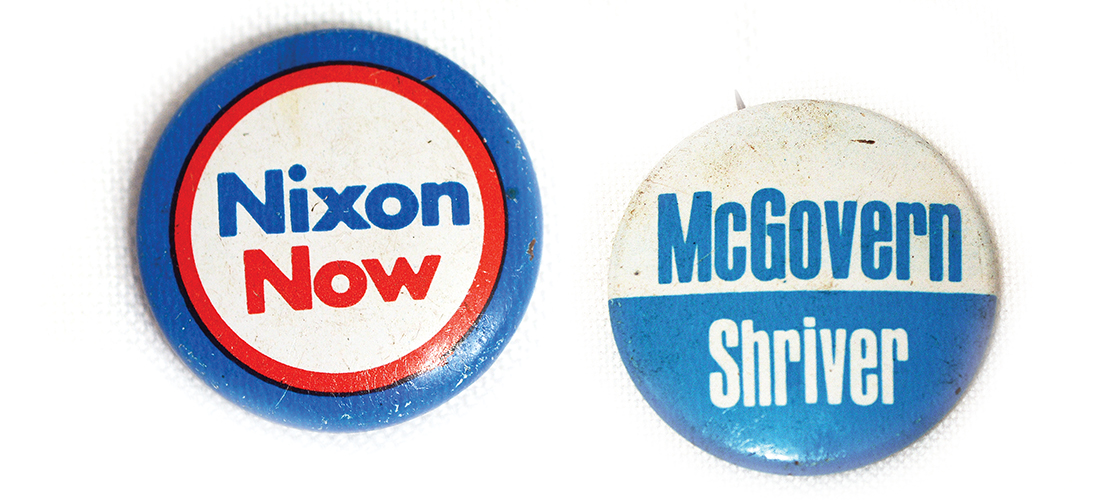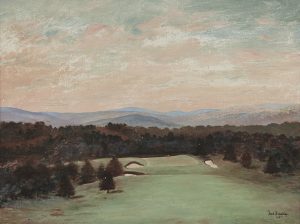
Memories of a campaign that fired up a budding journalist
By Bill Fields
The 1972 election is remembered mostly as a snoozefest because of the landslide victory by incumbent President Richard Nixon over George McGovern, but it woke up an eighth-grader to politics.
I had paid only sporadic attention earlier. I remember the sadness when my mother told me at the breakfast table that Robert F. Kennedy had died after being shot during the 1968 campaign, when we later had a mock election in fourth grade. I recall having a Bob Scott For Governor button and seeing a rare Eugene McCarthy bumper sticker on a car in Southern Pines, where my parents voted at the firehouse precinct on East New Hampshire. That same year, of course, with the Vietnam War and civil rights on the front burner, Jesse Helms was in peak form delivering his conservative editorials at the conclusion of the WRAL Channel 5 television news broadcast, spewed nightly since the year after my birth.
Four years later, as my interests broadened from the sports section to include the real world, I devoured what political news I could get. That meant the Greensboro Daily News that arrived in our yard each morning and forays to the town library to look at The New York Times. One of the Times’ political columnists, Tom Wicker, I would learn later, was born and raised in Hamlet and graduated from UNC-Chapel Hill.
Some Sundays, I settled down in front of Lawrence Spivak on “Meet the Press” and more closely watched the “CBS Evening News” with Walter Cronkite. Scanning the AM dial on winter evenings looking for basketball games from faraway cities, I paused for reports from primaries in New Hampshire or Iowa.
What really fired up my political passion was the presence downtown of the local Democratic and Republican party offices, each of which rented space on or near Broad Street. Although my views had already begun to lean far away from Helms — if he was Manteo, I was Murphy — I was an equal opportunity collector, taking any button or bumper sticker the volunteers for either side would let me have.
Making return visits, I rounded up what I could until realizing that the people manning the offices weren’t too keen on someone who wouldn’t be old enough to vote for a couple of elections hoarding their stuff. The folks were generous enough, though, that I created my own campaign corner in my bedroom, the buttons with their sharp pins and stickers with their pungent smell taking over my bulletin board, new teams to follow in a larger league.
Election Day, Nov. 7, 1972, was quite a day for the GOP. Nixon routed McGovern, winning everywhere except Massachusetts and the District of Columbia. Helms, parlaying the recognition and support from his decade-plus on TV, defeated Democrat Nick Galifianakis for a United States Senate seat in North Carolina. With Scott unable to run because of term limits, Republican James Holshouser beat Hargrove “Skipper” Bowles for N.C. governor.
My immediate impressions of Nixon’s lopsided victory came from the Greensboro paper and the network news shows. “Nixon Wins Re-Election In Landslide,” the large, eight-column headline on the front page blared on Nov. 8. Wicker, acknowledging the rout and trying to look on the bright side, wrote in his Times “In the Nation” column on Nov. 9: “Those of us who have most seriously questioned Mr. Nixon in his first term and in his re-election campaign are all but compelled by the size of his victory to assume the best from him now.”
Like lots of aspiring journalists, before too long I would immerse myself in two books about the campaign: The Boys on the Bus, by Timothy Crouse, and Fear and Loathing: On the Campaign Trail ’72, by Hunter S. Thompson. Although Crouse’s book in particular skewered the rise of pack journalism, those were glory days for print journalism, and newspaper ink was an intoxicating thing.
During college at Carolina, several of us in an advanced reporting class got to huddle with Wicker over a few Heinekens at Harrison’s bar on a Friday afternoon. It was a fascinating couple of hours with a legend generous with his time and his stories, an opportunity that a boy far from a press bus couldn’t have imagined. PS
Southern Pines native Bill Fields, who writes about golf and other things, moved north 30 years ago but hasn’t lost his accent.





